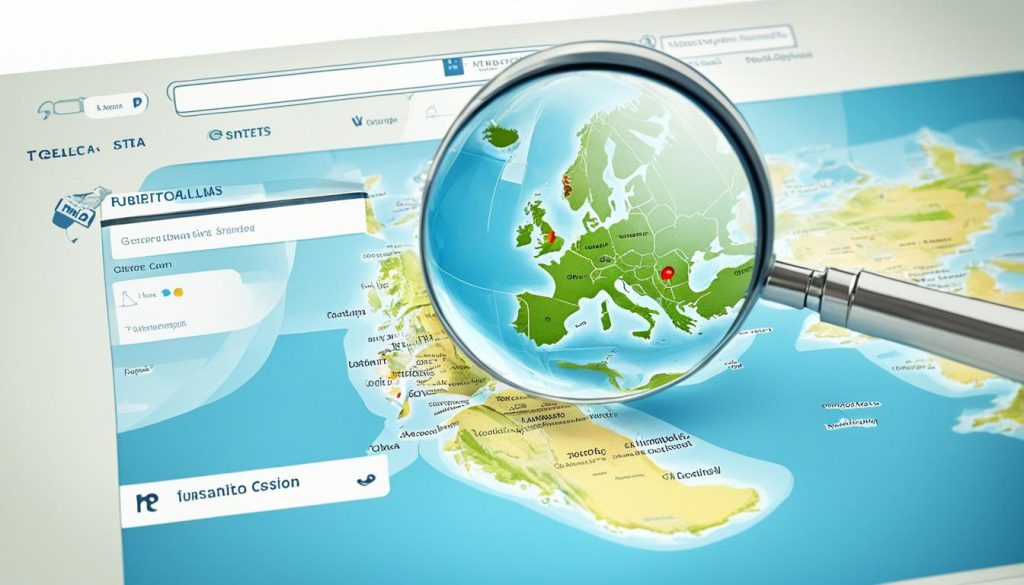Jumping into entrepreneurship in the UK is thrilling yet tough. To succeed, you need a complete checklist. It should cover every part of starting a business, such as market research, understanding rivals, forming a company officially, and managing daily tasks.
The first step is finding a good business idea. Then, write a detailed plan and pick a catchy name. You must understand legal stuff, get money, build your brand, and start online. This careful plan lowers risks and helps you find long-term success.
Key Takeaways
- Find a business idea that meets market needs.
- Write a detailed, strategic plan for your business.
- Pick a memorable, unique name for your business.
- Learn about legal requirements and pick the right business setup.
- Get the funding needed and create a strong brand.
Research Your Business Idea

Validating your business idea is key at the start. It’s important to know the industry and what customers want. Learn about the competition to find your edge. Making sure your product meets customer needs is also crucial.
Market Analysis
Understanding the market deeply is the first step to validate your business idea. You need to know about current trends and the balance of demand and supply. It’s also useful to consider how economic factors might affect your business. You can find useful market data from sources like Statistra and government reports.
Competitor Analysis
Knowing your competition well can help you stand out. Look at their strengths and weak points, how they price items, and their place in the market. This information can help you find a special spot in the market. Using a SWOT analysis can also help you see where you can be stronger than others. Companies like Tesco and Marks & Spencer show how to compete effectively.
Identifying Your Target Audience
It’s vital to know who will buy your product or service. Detail your ideal customer’s age, gender, income, lifestyle, and values. This helps shape your marketing and product creation. Talking to potential customers in focus groups and on social media can also give you great insights.
By looking at the market, competition, and knowing your customer, you can make sure your business idea will work. Getting advice from experts and support from government sources can also help make your business stronger.
Write a Business Plan

Creating a business plan is crucial for a company’s strategy. It includes the mission, goals, and how to sell and operate. This ensures a solid structure for managing the business. Let’s look at what makes a good business plan.
Setting Objectives
It’s vital to have clear business objectives. They help achieve the company’s mission. Objectives must be SMART: specific, measurable, achievable, relevant, and timed. This helps steer daily work and aids in checking progress.
Defining Your Unique Selling Proposition (USP)
Explaining your USP is crucial for standing out. It’s what makes your product or service special. By defining this, you make sure your marketing speaks clearly to your audience. This helps customers know why to choose you.
Financial Projections
Financial planning is key in a business plan. It shows your financial future, which is critical for attracting investment. You’ll need cash flow forecasts, profit predictions, and a break-even analysis. This outlines how your business will grow financially.
Choose Your Business Name

The business naming process is key to building your brand. It should resonate with your audience, stand out, and be timeless. Here, we explore how to find that perfect name.
Brainstorming Ideas
Begin by brainstorming with your team. Look for names that show what your business does and what makes it special. Make a list, thinking about what these names say about your brand.
Checking Name Availability
Next, check if your favourite names are free to use. Search in business registers like Companies House and the Intellectual Property Office in the UK. This makes sure your name is unique and avoids legal issues.
Testing Name Resonance
Last, see how people react to your name. Make mock-ups of adverts and ask for feedback. The name should be easy to say, remember, and give the right impression. This helps to make sure it works well with your target audience.
Register Your Business

Registering your business makes it official and ready for success. This important step helps you meet legal rules. Here are the main steps to take:
Selecting a Business Structure
The structure of your business impacts your legal duties and taxes. Choices include a sole trader, partnership, or limited company. Get advice from accountants or solicitors to understand the benefits and drawbacks.
Legal and Tax Implications
Each structure has its own rules for legality and taxes. Sole traders have simple accounts but risk personal assets. Limited companies are protected but face complex reporting. Register with HMRC and Companies House to handle taxes and enjoy tax breaks.
Opening a Business Bank Account
It’s smart to keep personal and business money separate. A business bank account makes this easier. It helps with bookkeeping and looks professional. Most banks offer special accounts for new businesses.
Finance Your Business

Setting up the right financial base is critical for any startup. There are many funding options for businesses. Using these resources wisely can lead to success.
Start-up Grants and Loans
Finding grants and loans can give your business a key boost at the start. Organisations like the British Business Bank have special schemes to help. They provide the funds needed for a strong beginning.
Crowdfunding and Peer-to-Peer Lending
Crowdfunding and peer-to-peer lending are becoming more common. They let you get funding without only depending on banks. Services like Kickstarter and Funding Circle link you with those eager to invest in new ideas. This helps turn your business dreams into reality.
Building a Business Credit Score
Gaining a good business credit score is crucial for lasting success. It means better loan rates and terms. By keeping your finances in order and meeting obligations, your business will thrive, ready for future growth.
Build Your Business Brand

Making your business stand out is key. It’s vital to connect with your audience through an authentic identity. This identity sends the right message and values to your customers. A well-thought-out branding strategy gives you an edge over competitors.
Creating a Company Logo
Designing your logo is a foundational step in branding. It’s not just a graphic; it represents your brand’s heart. Make sure your logo reflects your company’s ethos and mission. It should instantly link to your core values.
Developing Brand Identity
Once your logo is set, work on a consistent brand identity across all touchpoints. This should include packaging, your website, and all marketing materials. Use uniform colours, typography, and imagery to build recognition. This consistency strengthens your brand strategy.
Brand Messaging and Core Values
The essence of your brand lies in its messaging and core values. Identify what your company truly stands for. Communicate these principles clearly and engagingly to your audience. This should meet customer expectations, building strong, lasting connections.
In essence, successful brand building combines logo design with a thoughtful brand identity and messaging. Together, they showcase your values and set your business apart in a crowded market.
Secure a Website Domain

Securing a website domain is crucial for your online identity. A good domain name boosts your presence online. It also helps customers remember and find your business. A smart method for domain name registration makes your brand shine online.
Start by thinking of domain names that match your business and goals. Here are some important tips:
- Ensure the domain is memorable and simple to spell.
- Avoid complex or long names that could confuse people.
- Pick a domain that mirrors your online business identity and what you offer.
After picking some names, check if they’re available. A domain registration service helps you easily find and register available domains. Watching for name variations is smart to protect your digital presence.
Next, think about the best domain extension for you. While “.com” is very common, “.co.uk” or other specific extensions might be better for your identity.
Holding a secured domain means more than just owning an address. It shows your brand’s identity online. Putting effort into this step forms a strong, recognisable online presence.</ rence.
Create a Website

Creating a website is key for any new business. It’s your brand’s online face and attracts potential customers. A good website engages users, boosts sales, and shares important info.
Designing for User Experience
A user-friendly design is crucial. It should be easy for potential customers to navigate and find what they need. Make sure your website’s design includes:
- Streamlined navigation bars
- Responsive design for mobile devices
- Accessible and readable content
- Visually appealing graphics and layout
Setting Up Ecommerce
Adding ecommerce lets you sell directly to customers online. You need a safe, easy-to-use shop with various payment options. Essential parts of ecommerce are:
- SSL certificates for secure transactions
- Multiple payment gateways such as PayPal, credit cards, and digital wallets
- Inventory management systems
- Order tracking and customer support features
SEO Best Practices
SEO makes your website more visible on search engines like Google. Using smart SEO strategies helps customers find you. Remember these key points:
- Incorporating relevant keywords, such as search engine optimisation and ecommerce solutions, naturally into the content
- Creating high-quality, original content
- Optimising images with alt tags
- Ensuring fast load times and mobile optimisation
To really make your website work for you, focus on user-friendly design. Also, don’t forget ecommerce and SEO practices. This will help drive your business forward.
Arrange Business Insurance

Getting the right insurance is key to protect your business from surprises. It keeps your business safe and helps it keep running smoothly by covering unexpected events.
Liability Insurance
Liability insurance is vital to defend your business against claims from your products or services. It protects your company from lawy’s fees and financial loss if customers are unhappy.
Property and Contents Insurance
This insurance guards your business’s physical stuff. It covers damage from fire, theft, or natural disasters. It helps keep your business running by protecting important equipment and stock.
Business Interruption Insurance
Business interruption insurance is crucial for keeping your business going. If something unexpected like a natural disaster happens, it covers lost income and helps with ongoing costs. This way, your business can stay afloat in difficult times.
Hire Employees
Hiring employees is a crucial part of growing your business. It requires understanding recruitment, law, and payroll. It’s important to clearly define job roles. This attracts the right talent and keeps the workplace productive and legal.
Understanding Employment Laws
Knowing UK employment laws is vital. It ensures a fair workplace. You must understand minimum wage, working hours, leave rights, and anti-discrimination laws. A good knowledge of these laws avoids legal issues and keeps the work environment positive.
Setting Up Payroll
Setting up payroll correctly is essential when you hire people. A good payroll system pays wages right and on time, while following tax rules. You can use in-house software or a payroll service. Either way, getting deductions right is key to avoid fines and keep staff happy.
Creating Job Descriptions
Creating clear job descriptions is critical for recruitment. Each should outline responsibilities, qualifications, and expectations. Good job descriptions make recruitment effective. They also give employees clear direction, which improves performance and satisfaction.
In short, knowing the law, managing payroll well, and clear job descriptions are key to recruiting successfully. These steps make sure your business is legal. They also help you get and keep the best people, which helps your business grow and innovate.
Build a Business Presence on Social Media
Using social media marketing is key for boosting brand awareness and customer engagement. Facebook, Instagram, and LinkedIn offer great ways to meet potential customers. By posting regularly and sticking to your brand values, you can make your business more visible and connect with your audience deeply.
To market well on social media, you need to do more than just post news. It’s about starting conversations with your followers, replying to their comments, and listening to their suggestions. Sharing behind-the-scenes content, customer stories, and interactive posts can really improve customer engagement. This makes people feel closer to your brand.
- Creating compelling content that resonates with your target audience
- Utilising analytics to track your performance and refine your strategy
- Collaborating with influencers to extend your reach
- Running targeted ad campaigns to drive brand awareness and conversions
Adding these factors to your social media strategy can boost brand visibility. It also helps build a community that supports your business.
Tools and Equipment Needed
Having the right tools and equipment is key for your business to do well. This is true whether you’re starting a small business or growing a bigger one. Choosing the right equipment is vital for your business to work efficiently.
Office Supplies
Office supplies keep daily activities running smoothly. Items like notebooks, pens, computers, and printers are essential. They help keep work flowing without problems. Always choose quality supplies to avoid disruptions and keep your operations smooth.
Production Equipment
If you make or produce goods, having the right machines is essential. It’s important to invest in machinery that fits your needs and is value for money. Keeping it well-maintained and updated keeps your business running well.
Administrative Software
Today, the right administrative software can make a big difference. It helps with tasks such as keeping track of finances, managing projects, and handling customer relationships. This software can make your business more efficient, save time, and cut down on mistakes, leading to success.
Setting Up Business Premises
Setting up your business premises is important for establishing your base and running your operations. You need to choose the right spot, understand the lease, and set up utilities smoothly. These steps are critical for your daily business activities.
Finding the Right Location
Finding a good location is key for your business to be seen and easily reached. Consider how close it is to your customers, the transport options, and the local people. Evaluating the area carefully ensures it fits with your business goals.
Commercial Lease Considerations
Understanding your lease agreement is crucial when you’re getting a commercial space. Make sure to check the terms about the rent, how long the lease lasts, and your renewal choices. Getting a legal expert to look over the lease can help you avoid problems and understand your responsibilities.
Setting Up Utilities and Services
Once you’ve got your location, set up all the utilities and services you need. Organising things like electricity, water, and internet makes sure there are no interruptions. Starting these services early means your business can run smoothly from the start.
Planning well in these areas helps your premises support your business’s growth. It provides a solid base for your work.
Starting a Company in the United Kingdom – Essential Checklist
Starting a business in the United Kingdom needs careful planning. Our checklist makes this process easier by showing you the key steps. It ensures you cover all important aspects for your business to thrive.
- Business Plan: First, develop a detailed business plan. It outlines your goals, strategies, and financial forecasts. It’s the roadmap for your business.
- Legal Registration: Next, register your company legally. Choose whether to be a sole trader, partnership, or limited company. Then, register with Companies House and HMRC to meet UK laws.
- Branding: Creating a strong brand is vital. Develop an eye-catching logo and consistent messaging that shows what your company stands for. This helps in winning trust and recognition.
- Funding Options: Finding the right funding is key. Look into grants, loans, and crowdfunding to get the financial support you need for growth.
- Online Infrastructure: A strong online presence is essential. Get a good domain name, create an easy-to-use website, and use SEO to improve your online visibility.
- Hiring Practices: Building a great team is crucial. Understand employment laws, write clear job descriptions, and set up a good payroll system. This ensures your operations run smoothly and keeps employees happy.
Follow this checklist to build a strong foundation for your business. It guides you through each step with confidence and clarity.
Ongoing Business Activities
Launching your business is just the start. Ongoing efforts are key to keep your company growing. Activities like market analysis are vital. They help you understand trends and changes in what customers want. This knowledge lets you improve constantly, keeping your services competitive.
Changing your marketing tactics based on research can boost your presence and connection with people you aim to serve. Staying on top of finances and legal requirements is also important. Updating your business plan regularly helps ensure your strategies fit the changing market. This gives you a clear plan for reaching your goals.
Looking for new ways to grow and develop is crucial for lasting success. Reviewing and tweaking how your business runs helps tackle inefficiencies quickly. This encourages a culture where improvement never stops. By doing these ongoing activities, your business can overcome obstacles and seize new opportunities. This way, you’ll cement your company’s position in the market for the future.
















